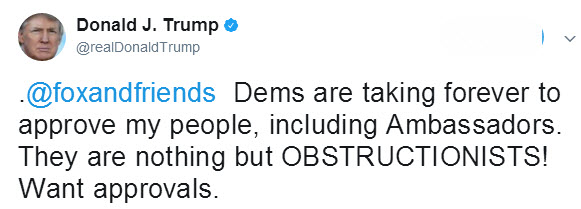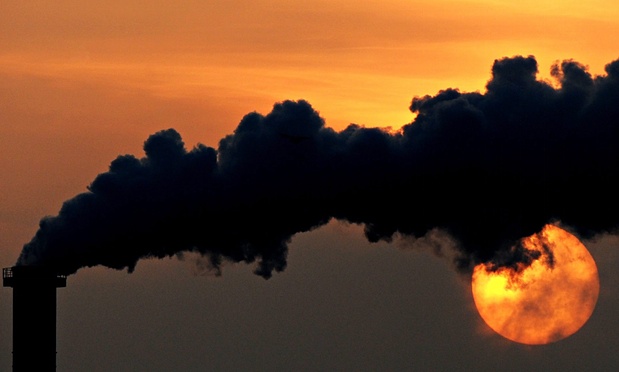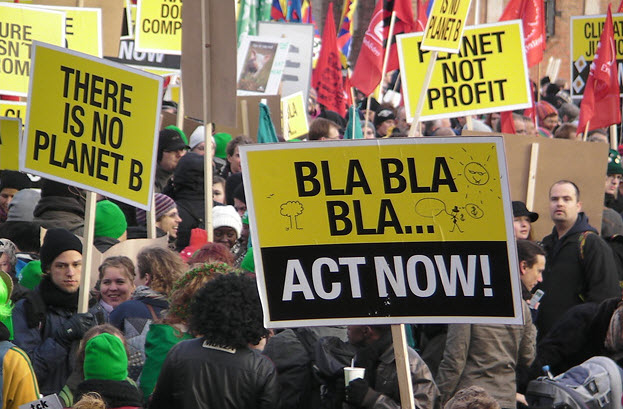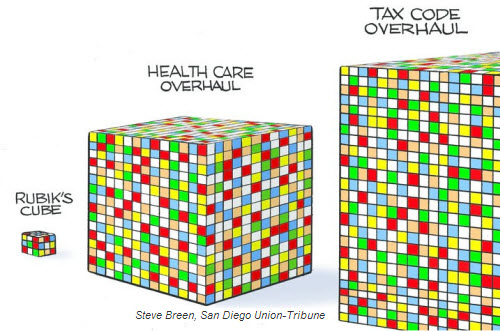A Government Gone Missing
Part of what drew votes for Donald Trump was the belief that he was a successful businessman who could impart decisiveness and management efficiency to the job, following a president viewed by many as overly professorial and diffident. Instead, the turmoil in the White House has been stunning and Donald Trump’s inattention to the rest of his government even more so. There are some 1,200 positions in the federal government that require Senate confirmation — far too many, but that’s its own subject. Of those, the By his first 100 days, the president had nominated 66 of those 556 slots with 26 confirmed. At the 100-day mark, Barack Obama had nominated three times as many — 190 — and had 69 confirmed. Trump tweeted the following in early June: On Fox News the president said that leaving open “hundreds and hundreds” of jobs was all to the good “because they’re unnecessary to have”. But this hardly represents much of a savings in a government that has, per the Office of Personnel Management, about 2,633,000 civilian employees. And these empty seats near the top of their organizations leave a management void where decisions are not made and lower employees are left in limbo. “Without their leadership, career civil servants will default to inaction”, said Bush Steven Mnuchin, charged with developing tax reform and facing the onrushing debt ceiling, is the lone Senate-confirmed official at Treasury. Rex Tillerson must contend with a 29.1% funding cut for his State Department, at least in the budget the White House wants. Trump wants to cut the Environmental Protection Agency by 31.4%. Rather than fill empty seats, the president has moved in the opposite direction. In March, the president demanded the immediate resignations of all 46 Obama administration U.S. attorneys still on the job, told to clear out by the close of business that same day, disallowed the customary grace period of a few weeks to make an orderly exit. Three months went by before Trump announced in mid-June the “ He is now going after the inspectors general at the various agencies, first considering firing them en masse, and instead crimping their budgets as an alternate way to hobble their job of ferreting out waste, misconduct and criminal activity in the bureaucracies. This is one of his more inexplicable reversals. Trump had repeatedly cited “tremendous waste, fraud, and abuse” in government during his campaign and in office. “That we’re rather not
In November, when his business holdings had become a controversy, Trump said, “In theory I could run my business perfectly and then run the country perfectly”. But once on the job he said of the presidency, “I never realized how big it was” to the Associated Press. “Every decision is much harder than you would normally make”. In an interview with Reuters he said, “This is more work than in my previous life. I thought it would be easier.” He has made it more difficult. With so many jobs to fill, the growing problem has been the reluctance of qualified people to accept jobs. They have watched the debacle of FBI Director James Comey’s firing and Trump’s tweets and comments that followed (“He was crazy, a real nut job”, said Trump to the Russians visiting the Oval Office). At least five turned down the plum of running the FBI before Christopher Wray apparently acceded to go through the vetting process. One of the reasons Mnuchin is lonely at Treasury is that his choice for the No. 2 job has dropped out.
Job prospects have heard of the treatment of people in the West Wing. There are perpetual rumors of White House staff shakeups after only five months. Communications Director Mike Dubke quit after only three. Chief of Staff Reince Priebus seems always on shaky ground.
Think what you will of beleaguered Sean Spicer, but he has valiantly gone to absurd lengths to cover for his boss, but his reward for loyalty is to look for his own replacement says the scuttlebutt. Those sought by Trump to fill posts have seen him turn on allies. His knowledge of the law, which may not extend much beyond bankruptcy protection and lawsuits, seems not to embrace legal principles. He was and continues to be furious at Attorney General Jeff Sessions for recusing himself quite properly over the Russian matter in compliance with Justice Department rules. He was in conflict with the Russia investigation for having had contact with the Russians himself. Sessions joined the campaign early on and was closely allied with Trump, yet now has reportedly been harassed by an unforgiving president, giving rise to rumors that he offered to resign. Apparently Trump thought Sessions, sitting aside Justice, would throttle the Russia investigations for him. Job candidates are hesitant having most recently seen Trump go after Rod Rosenstein, the deputy attorney general, with this early morning tweet, Rosenstein says it was Trump who asked him to write a memo setting forth the rationale of why Comey should be terminated. He says he knew before writing that Trump already intended to fire Comey, and, as it turned out, for reasons having nothing to do with what was in Rosenstein’s memo. But Trump acted on Rosenstein’s recommendations immediately, with the pretext of what else could he do if the Justice Department itself urged him to fire-for-cause one of its own? That wasn’t the first time the president lied to shift blame to others. Trump’s demand for loyalty, a suggestion that it should override the primary loyalty to the country that is implicit in government service (and explicit in posts that call for sworn allegiance to the Constitution), is off-putting to those now asked to join the administration. Back in February, Christopeher DeMuth, at the Hudson Institute, wrote in a Wall Street Journal op-ed: “President Trump has not only picked extraordinarily capable men and women, he has self-assuredly encouraged them to speak their minds. ‘I want them to be themselves,’ he tweeted, ‘and express their own thoughts, not mine!’…Most of all, President Trump is comfortable with controversy and dissent, indeed often incites them to advantage”. Would DeMuth like to have that one back? Anyone who saw his first cabinet meeting on June 12th (not held until almost five months after his inauguration) had reason to wonder about Mr. deMuth’s judgment. Clearly all in the cabinet were told to come with a message of praise and thankfulness for being among the chosen. “We thank you for the opportunity and the blessing you have given us to serve your agenda” was the Priebus offering. From Tom Price we heard: “What an incredible honor it is to lead the Department of Health and Human Services at this pivotal time under your leadership. I can’t thank you enough for the privilege you have given me and the leadership that you’ve shown.” The session should not be missed. It can be watched here. one strike you’re out
In this administration, a “team of rivals” was not to be. As the transition team looked for candidates, anyone who was found to have criticized Trump during the campaign or transition was stricken from the list. Given the reaction of so many to the objectionable conduct of his campaign (“Get him out of here”; “I’d like to punch him in the face”), that served to shred the list. Elliot Abrams, who had served in foreign policy positions under Reagan and the second Bush, was asked to vet possibilities only to see one after another crossed off for some disparaging comment on cable or letter to an editor. Then, when Trump considered Abrams himself for deputy secretary of state, the same problem cut him from the list. abdication
The Constitution gives Congress the power to declare war but then comes right out and unequivocally says in Article II, Section 2, “The President shall be Commander in Chief of the Army and Navy of the United States”. As yet another check and balance, the Founders’ intent was to place control over the military in civilian hands to insure that the military does not go off on its own. It is the president’s assignment to decide against what adversary to deploy (or withhold) forces, approve strategy, set limits of engagement, and protect the lives of troops. Does the president have a more important job than that? And yet in mid-June President Trump absolved himself of a key slice of those responsibilities, effectively turning over the war in Afghanistan to the Pentagon, leaving it to Defense Secretary James Mattis to decide how many troops to deploy. Winning is what the military views as its assignment and that usually translates as more troops. The generals under Mattis want another 5,000 to add to the 9,800 already in country, so we are likely to see an escalation of the 16-year-old war — the longest in American history — but with a president positioning himself as having nothing to do with the outcome. That is, if the results go badly. The lack of a personnel understructure makes Trump’s Pentagon decision worse. Interviewed on the PBS NewsHour, Lt. Gen Douglas Lute, who focused on Afghanistan while on the national security staff under George W. Bush and Barack Obama, said of the Trump administration: “They’re working with a handicap. And that is, while the National Security Council itself, those who set strategy and overwatch the strategy, is largely in place, the implementers of the strategy are largely not in place, because they have a large number of vacancies among those officials who are yet to be nominated and confirmed by the Senate, especially in the Defense Department and the State Department.” President Trump needs to realize that he cannot run the government by himself. When he makes decisions he may find himself hearing echoes in the halls of the government if there’s no one there to execute them.
President Trump’s cabinet did not hold its first meeting until June 12th.
Partnership for Public Service names 556 as key to policymaking. On the campaign trail, Trump bragged of his managerial experience repeatedly, so it is puzzling that filling those key posts has been seriously neglected. It is a formidable job, admittedly, but it’s an essential management commandment first to make sure the troops have what they need to move forward, then tend to your own work. The self-absorbed Trump hasn’t shown that he knows that.
The Washington Post has kept score and shows a longer “average time to confirm” for Trump appointees, but only nine days longer than for Obama. The greater problem is that the Senate can only confirm those formally nominated and almost five months into his administration, Trump has nominated only 103 (with 42 confirmed). There are still 409 positions for which there are no nominees.
consigliere Karl Rove, and the changes that Trump has promised will not happen.
first wave” of candidates to fill empty posts — but only eight. 
taking care of”, he said. “That we’re taking care of”. He even said the savings from cutting that unholy trinity would be enough to pay for not cutting Social Security. Those savings were mocked as wildly insufficient, but Michael Horowitz, chairman of a group that represents the inspectors, told Congress that in 2015 the inspectors had identified $26 billion in potential savings and a further $10 billion from criminal and civil cases. Cutting the budgets of the few income producing sections of the government is brainless.





